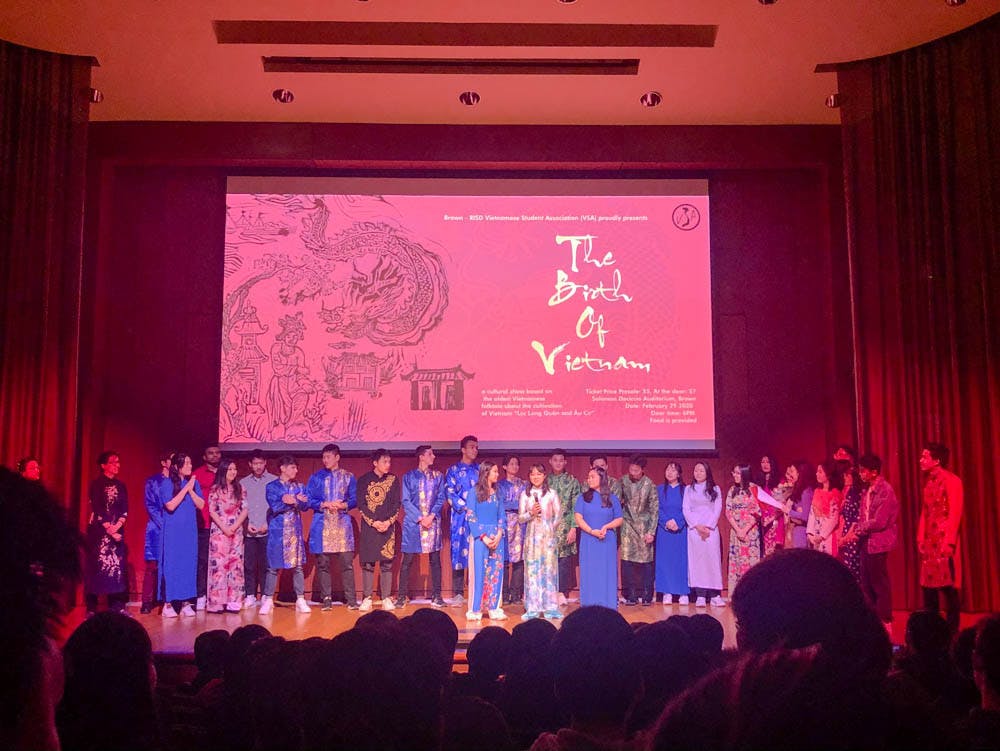On Saturday night, a steady stream of attendees headed into the Salomon De Ciccio Family Auditorium for the Vietnamese Students Association’s annual culture show. Spotlighting traditional Vietnamese culture infused with modern performance elements, the play engaged audiences with its relatable humor, vibrant colors and guest performances from Brown Lion Dance, Shirley Shi and Attitude Dance Company.
Bella Hoang ’22 and Nancy Tran ’22, the culture chairs of VSA who planned the production for six months, said they wanted this show to stand out from past culture shows and be “more connected” with a central storyline.
They first decided on the theme of the traditional Vietnamese folktale “Lạc Long Quân and Âu Cơ,” or the “Dragon Lord and Mountain Fairy,” and they then reached out to performers to join at different points of the story.
“The culture show this year is the most ambitious project we’ve had,” said Long Do ’22, Vice Chair of VSA. “I was really happy about (the show) honestly,” he added. “This (was) our best run-through.”
The play’s story opened with two grandchildren, played by Tran and Thien Nguyen ’22, returning home to Vietnam to listen to a story told by their grandmother, played by Amanda Ngo ’21 who is post- editor-in-chief. The narrative then began with Dragon Lord of Lạc, played by Do, who falls in love with Âu Cơ the Mountain Fairy, played by Hoang, while fighting monsters. Âu Cơ soon gives birth to 100 eggs who become the first human beings of Vietnamese society. As the Dragon Lord wishes to return to the sea and Âu Cơ yearns for her homeland, they separate. Their oldest child then becomes the first king of Vietnam.
Hoang explained the significance and symbolism of the story. “Even though we are very spread out, we are still Vietnamese people,” she said, referencing Vietnam’s geographical diversity, which ranges from mountains to coastal areas.
What followed was an entertaining blend of Vietnamese traditional lore and comedic college references: sketches included jokes about visits to the Nelson Athletic Center, and about the concept of letting go of one’s Orgo grade.
Do explained that to avoid sharing Vietnamese culture in a “disconnected and foreign way,” they included jokes about life at Brown to find “common ground” with the audience. “One really important thing we can do is share (Vietnamese) culture with a broader range of people,” he said.
Performances of traditional Vietnamese music and dance were interwoven with the play’s scenes. The VSA Fan Dance Troupe, dressed in elaborately designed áo dài — Vietnamese national garments — danced with pink flowing fans and bamboo hats. Red and gold lions, operated by two dancers within each, performed stunts amid a vigorous drum beat and the audience’s cheers.
During the intermission, audience members were served fried rice, spring rolls and curry vegetables — in reference to “grandma’s cooking.” Afterward, the separation between the characters of Lạc Long Quân and Âu Cơ took place. In the sadness of parting and hopes for a better future, Shirley Shi ’22 played the yangqin under melancholy violet light, which was followed by a moving performance of classical ballet and contemporary dance by Attitude Dance Company.
The play closed with the 100 children of Lạc Long Quân and Âu Cơ, clad in green and blue áo dài symbolizing the earth and the sea, reuniting on the stage. The new King Hùng, played by Nathaniel Nguyen ’20, emerged wearing a fiery red áo dài.
“We are the descendants of dragons and children of fairies. This is who we are.” Nguyen declared, closing the show with a powerful ending that reiterated the origins of the Vietnamese and the love and friendship that unite them all.
The show was “bigger than (we) could have imagined,” said Malery Nguyen ’20, Co-Chair of VSA alongside Vivian Van ’21. “I’m very grateful for the culture chairs for envisioning such a grand scale and for executing it to the success that it was.”
Correction: A previous version of this article misspelled Âu Cơ as u Cơ. The Herald regrets the error.





